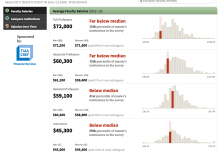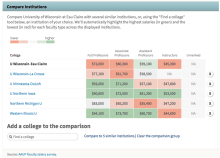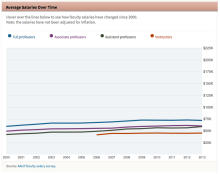The Chronicle of HIgher Education has published its lastest salary data for faculty and academic staff at colleges and universities across the country, and the picture is not pretty. UW-Eau Claire salaries for all faculty and staff lag behind those of most of our peer institutions in the upper Midwest, and they rank "below" or "far below" the median of all Master's-level universities in the country.
The data come from the American Association of University Professors' (AAUP) annual survey. These data come from the 2012-13 academic year, and 1,142 institutions of higher education submitted data. You can analyze the data yourself here. Screenshots of the results are included here, because the website's interface does not easily allow one to save data with selected peer institutions.

Compared to all Master's-level universities in the survey, Full professors and Associate professors have salaries in the 12th percentile. Instructors faired slightly better, with salaries in teh 29th percentile. Assistant professors faired the best, with salaries soaring into the 41st percentile. Assistant professors are the least far behind their peers than other categories because universities must offer competitive salaries in order to attract new Assistant professors on the job market.

Compared to our peer institutions, again, Assistant professors have the most competitive salaries, but all other categories of faculty and staff have salaries below our peers. In the figure above, the institutions selected come from UW-Eau Claire's official list of peer institutions; we then selected the closest comparable institution (for whom salary data was available) in Wisconsin and in each surrounding state.

Finally, examining salary data over time, it is evident that salaries have remained flat. Even if the scale of the graph were changed, the slow rate of growth is evident. Though this is unlikely to surprise anyone on campus, three things are worth pointing out about this graph:
1) The gap between Assistant and Associate professors has almost entirely disappeared, which shows that UW-Eau Claire should devote more resources to retaining faculty, once they are hired.
2) The trend does not adjust for inflation, which would most certainly show that real, take-home pay has not kept pace with rising costs of health care, energy, and other commodities.
3) The trend does not account for the fact that, in 2011, all employees took a large deduction in their take-home pay. Beginning that year (thanks to Act 10), all Wisconsin state employees began contributing 7% of their salary to the Wisconsin Retirement System.
Summing up, the compensation for UW-Eau Claire faculty and staff is bad and getting worse, once health care and retirement contributions are taken into account.
The United Faculty and Academic Staff of UW-Eau Claire is dedicated to improving the compensation of all faculty and staff, so that the contributions of all employees are adequately recognized and rewarded.
